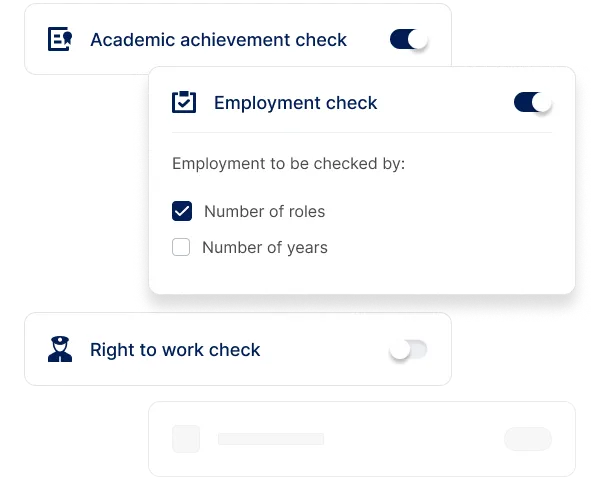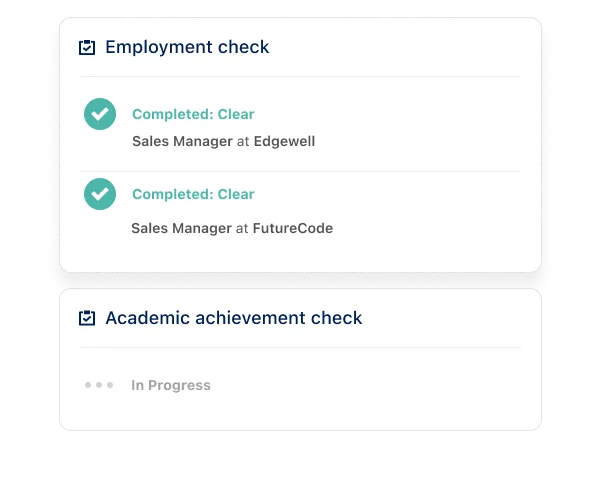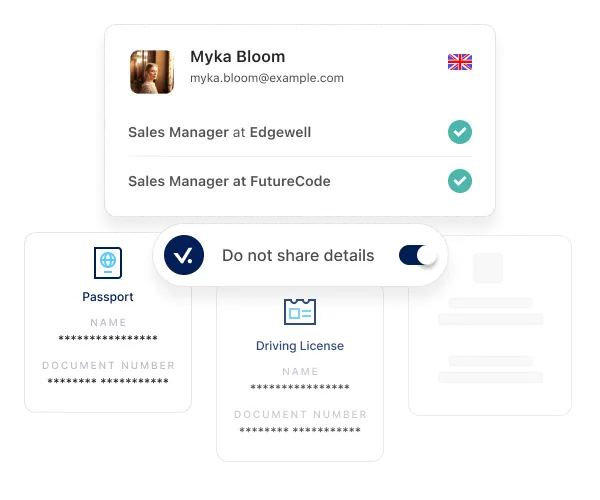Protect your organization - and the public - from the risk of financial fraud.

CIFAS checks: additional security for high-trust roles
A CIFAS check is a type of background screening specifically related to combating identity fraud and financial crime. It is typically used in the UK finance sector to provide an additional layer of security when hiring for roles that require high levels of trust.
If a financial institution makes an adverse judgment on an individual or a business, it can issue a CIFAS marker against them. This marker is then flagged up on a CIFAS check. Businesses use this check to prevent financial fraud and protect individuals and businesses from becoming victims of identity theft or fraudulent activities.
This check was launched by CIFAS (Credit Industry Fraud Avoidance System) as part of its fraud prevention and detection services.
Our CIFAS check:
- Searches the CIFAS databases: either the IFD or EIFD based on employers’ CIFAS membership
- Identifies if an individual has any fraudulent activity matches in the CIFAS databases
- Collects individuals' consent, agreement to CIFAS Fair Processing Notice, and information required to run the check via Veremark’s platform
Trusted by the world's best workplaces






PROVEN
.png)
.png)




and Loved by reviewers
Easy
Reduce risk
No lock-in
Global checks
24/7 support
Faster time to hire
Veremark's CIFAS check involves thorough searches of CIFAS databases to verify whether an individual has a history of fraud. Depending on employers' CIFAS membership, Veremark conducts searches in either the Internal Fraud Database (IFD) or the Enhanced Internal Fraud Database (EIFD), which also includes the National Fraud Database (NFD).
By utilizing these comprehensive fraud prevention databases, Veremark helps employers safeguard against potential risks, protecting their organization from financial and reputational damages.
This ensures they hire dependable individuals who can contribute to the advancement of their organization.
How it works



Related checks
FAQs
To perform a CIFAS check, a member of our team submits the relevant details of the individual to be checked. The check may search the Internal Fraud Database (IFD) or the Enhanced Internal Fraud Database (EIFD), which also includes the National Fraud Database (NFD).
CIFAS checks can be conducted by organizations that are members of CIFAS, such as Veremark.
As a member, we have access to the CIFAS databases, including the Internal Fraud Database (IFD) and the Enhanced Internal Fraud Database (EIFD), which also includes the National Fraud Database (NFD). We can use these databases to conduct CIFAS checks on individuals to verify if they have a history of committing fraud or have been associated with fraudulent activities.
Individuals themselves cannot conduct a CIFAS check on their own behalf. CIFAS checks are typically done by employers or organizations as part of their due diligence in the hiring process or to assess the potential risks associated with their customers or clients.
A CIFAS check reveals information related to an individual's history of fraud or fraudulent activities. Specifically, it searches the CIFAS databases, which include the Internal Fraud Database (IFD) and the Enhanced Internal Fraud Database (EIFD) that also includes the National Fraud Database (NFD). The check aims to verify if the individual has been associated with any fraudulent activities or has a history of committing fraud.
The information obtained from a CIFAS check is used to assess the individual's risk level in terms of potential fraud and to help organizations make informed decisions, especially when it comes to hiring, lending, or providing services to customers or clients. It can also assist in detecting and preventing fraudulent behavior within an organization and protecting against financial losses and reputational damage associated with fraud.
It is essential to note that a CIFAS check does not provide details about other aspects of an individual's background, such as employment history, qualifications, or criminal record. It specifically focuses on identifying potential fraud-related risks.
A CIFAS check can benefit employers in several ways:
- Fraud Prevention: A CIFAS check helps employers identify individuals with a history of fraud or fraudulent activities. By screening potential employees or customers through CIFAS, employers can minimize the risk of hiring or working with individuals who may pose a fraud risk to the organization.
- Risk Mitigation: Hiring an individual with a history of fraud can lead to financial and reputational risks for employers. A CIFAS check allows employers to assess the risk level associated with a candidate or customer, enabling them to make more informed decisions and reduce potential liabilities.
- Protecting Assets: Organizations deal with sensitive and valuable information, finances, and assets. A CIFAS check helps in safeguarding these assets by preventing individuals with fraudulent tendencies from gaining access to critical resources.
- Enhanced Due Diligence: Conducting CIFAS checks demonstrates that employers take fraud prevention seriously. It shows a commitment to ensuring a safe and secure working environment, which can enhance the organization's reputation among stakeholders.
- Compliance and Regulatory Requirements: In some industries, conducting CIFAS checks may be a regulatory or compliance requirement. By fulfilling these obligations, employers can demonstrate compliance with relevant laws and regulations.
- Cost Savings: Avoiding hiring individuals with a history of fraud can save organizations from potential financial losses and legal costs associated with fraudulent activities within the company.
Overall, a CIFAS check adds an extra layer of protection to the hiring process and business relationships, helping employers build trust with their clients, customers, and partners while mitigating the risks associated with fraud.
No, a CIFAS check is not mandatory for all employers. CIFAS is a not-for-profit fraud prevention organization in the UK, and its services are typically used by businesses, financial institutions, and organizations that want to protect themselves against fraud and financial crime.
Certain industries and sectors, such as financial services, banking, insurance, and other sectors dealing with sensitive financial information, may have regulatory requirements that mandate the use of CIFAS checks as part of their compliance and due diligence processes.
However, for many other industries and businesses, conducting CIFAS checks is not a legal requirement. The decision to conduct a CIFAS check or any other background screening process is usually at the discretion of the employer or organization based on their risk assessment and internal policies.
Employers who choose to conduct CIFAS checks typically do so to enhance their fraud prevention measures and protect themselves from potential risks associated with hiring individuals with a history of fraud. It is essential for each employer to assess their specific needs, industry regulations, and risk tolerance before deciding to conduct CIFAS checks or other types of background screenings.
Transform your hiring process
Request a discovery session with one of our background screening experts today.






